Environmental Education
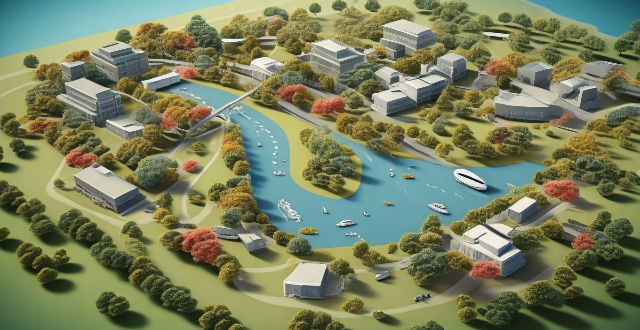
How does education contribute to raising environmental awareness among future generations ?
Education is crucial for raising environmental awareness among future generations, as it enhances knowledge, develops values, and promotes action. Incorporating environmental education into the curriculum empowers students with the necessary tools to understand and address complex challenges facing our planet. By fostering a deeper appreciation for nature and cultivating a sense of responsibility towards preserving it, schools can play a significant role in nurturing eco-conscious citizens who are well-equipped to confront and overcome environmental challenges.

What is the role of education in promoting environmental awareness and action ?
Education plays a crucial role in promoting environmental awareness and action by providing knowledge about the environment, developing environmental values, encouraging active engagement, teaching problem-solving skills, and providing opportunities for leadership development.

How can education promote environmental ethics ?
Education is crucial for fostering environmental ethics among students by integrating interdisciplinary approaches, real-world examples, and skill development. Experiential learning through field trips, hands-on projects, and community engagement helps instill a deeper connection with nature. Teaching sustainable practices like reducing waste and conserving energy encourages responsible resource management. Encouraging critical thinking through debates and research assignments enhances understanding of complex environmental issues. Cultivating empathy and responsibility involves promoting nature connectivity and global perspectives. Assessment and reinforcement strategies such as project-based assessments and recognition programs help evaluate and motivate students' commitment to environmental stewardship.

What is the role of education in addressing climate change ?
Education is pivotal in addressing climate change by empowering individuals with knowledge, skills, and attitudes necessary to understand and combat the issue. It cultivates a culture of sustainability and resilience, preparing future generations to face the challenges posed by a changing climate. Education raises awareness about the science behind climate change, promotes environmental literacy, and fosters a fundamental understanding of the complex interactions between human activities and the environment. By integrating climate change into school curricula and higher education programs, students learn about the importance of biodiversity, renewable energy sources, and sustainable practices, equipping them with the tools to make informed decisions and adopt eco-friendly behaviors. Education encourages critical thinking and problem-solving skills, which are essential for finding innovative solutions to mitigate and adapt to climate change. Students are encouraged to engage in projects and research that promote sustainability and environmental conservation. Education can inspire a sense of responsibility towards the environment, encouraging individuals to take active roles in protecting it. This can lead to community-based initiatives, such as tree planting, waste reduction campaigns, and advocacy for environmental policies. Educated citizens are better equipped to participate in democratic processes, ensuring that climate change is addressed through effective policies and regulations. They can hold governments and corporations accountable for their environmental impacts and push for systemic changes. Education is vital for developing a green economy by creating jobs in renewable energy, sustainable agriculture, and other environmental sectors. It prepares the workforce for industries of the future, where sustainability is a core value. Education promotes cross-cultural understanding and cooperation, which is essential for addressing a global issue like climate change. International exchange programs and collaborations can share best practices and technologies across borders. Education is crucial for building the capacity of communities disproportionately affected by climate change, enabling them to adapt and thrive despite adverse conditions. It ensures that everyone has access to information and resources needed to cope with climate-related challenges. In conclusion, education is a powerful tool in the fight against climate change, informing and empowering individuals to become agents of change.

How can education contribute to reducing carbon footprint ?
Education plays a pivotal role in promoting environmental sustainability by raising awareness, encouraging sustainable practices, and empowering future leaders. It can contribute to reducing carbon footprints through curriculum integration, real-world examples, interdisciplinary projects, community outreach, media campaigns, partnership with NGOs, implementing green initiatives in schools, teaching practical skills, developing critical thinking, nurturing eco-advocacy, and preparing students for careers in environmental policy making. By focusing on these aspects, education can significantly contribute to reducing carbon footprints and paving the way for a more sustainable future.

How can ecological protection areas contribute to environmental education and awareness ?
Ecological protection areas are crucial for both biodiversity conservation and environmental education. These areas offer hands-on learning experiences, interactive programs, sustainable practice promotion, community outreach, research efforts, and media publicity to raise awareness about the importance of preserving ecosystems. Through these initiatives, ecological protection areas can inspire individuals to adopt eco-friendly habits and contribute to global conservation efforts.

What is the significance of education in achieving the Sustainable Development Goals ?
Education is essential for achieving the Sustainable Development Goals (SDGs), as it promotes equality, economic growth, health and well-being, peace and justice, and environmental sustainability. By providing access to quality education for all, we can empower individuals, break down barriers to social and economic mobility, foster a better understanding of environmental issues, and encourage responsible consumption and production patterns. Education is also crucial for promoting gender equality and empowering women and girls, developing the skills needed to adapt to changing economic conditions and job markets, improving health literacy and promoting healthy behaviors, promoting human rights, democracy, and the rule of law, and building bridges between different cultures.

What role does education play in shaping consumer behavior towards environmentally sustainable practices ?
Education plays a crucial role in shaping consumer behavior towards environmentally sustainable practices. It provides consumers with the necessary knowledge to understand complex issues related to environmental sustainability, develops essential skills for engaging in sustainable practices, changes attitudes towards the environment, and improves decision-making processes. By increasing awareness, developing skills, changing attitudes, and improving decision-making processes, education lays the groundwork for a more sustainable future. As individuals become more knowledgeable and committed to environmental stewardship, they will naturally incorporate sustainable practices into their daily lives, ultimately contributing to a healthier planet for all.

What are the challenges in implementing environmental legislation ?
The text discusses the challenges in implementing environmental legislation, including lack of awareness and education, insufficient funding and resources, political will and support, legal and administrative hurdles, technological limitations, and international cooperation and coordination. Addressing these challenges requires a multi-faceted approach involving education, advocacy, policy reform, and collaboration at all levels of society.

How can education help combat climate change ?
Education is a powerful tool in the fight against climate change by fostering awareness, promoting sustainable practices, stimulating innovation, and shaping policy. It empowers individuals to make informed decisions and advocate for environmental protection through comprehensive science education, applied learning experiences, interdisciplinary research, and civic engagement. By integrating sustainability into curricula and encouraging global perspectives, education prepares future generations to tackle the complex challenges of climate change effectively.

How can we incorporate climate education into the school curriculum ?
Incorporating climate education into the school curriculum is crucial for preparing future generations to face the challenges posed by climate change. The strategies for integrating climate education include a cross-curricular approach, real-world applications, project-based learning, guest lectures and workshops, technology integration, critical thinking and problem solving, global perspectives, artistic expression, policy and advocacy, and continuous assessment. These approaches engage students across disciplines and prepare them for active participation in addressing one of the most pressing issues of our time.

Can environmental legislation effectively reduce pollution ?
Environmental legislation has the potential to effectively reduce pollution, but its success depends on various factors such as enforcement and compliance, public awareness and participation, technological innovation, political will, international cooperation, and economic considerations. Strong regulatory bodies, education campaigns, investment in clean technology, government prioritization of environmental protection, global collaboration, and balancing environmental goals with economic development are all crucial for the effectiveness of environmental legislation. Achieving lasting improvements in environmental quality requires ongoing effort from all sectors of society.

What are the benefits of using a remote education platform for learning ?
Using a remote education platform for learning offers numerous benefits that enhance the overall learning experience, including flexibility and convenience, personalized learning, collaboration opportunities, cost savings, access to quality education, improved learning outcomes, and environmental sustainability.
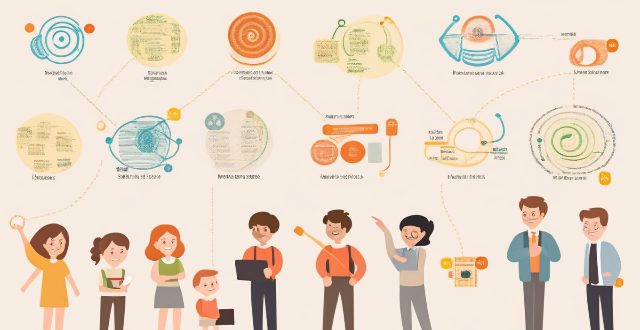
How can we make climate education more engaging for students ?
To make climate education more engaging for students, educatorTo make climate education more engaging for students, educator methods, technology and multimedia integrate the subject across the curriculum, foster curiosity, and connect with local issues and opportunities.

How can we encourage parents to support climate education at home ?
Climate education is crucial for children's understanding of environmental conservation. Here are ways to encourage parents to support it at home: 1. Provide information and resources like books, websites, and documentaries. 2. Suggest family activities such as nature walks and recycling projects. 3. Model environmentally friendly behaviors like reducing waste and conserving energy. 4. Encourage open discussions about climate change and its impact. 5. Participate in community events that promote environmental awareness and action.

What are the most effective ways to promote environmental awareness ?
Promoting environmental awareness is crucial for the sustainable development of our planet. Effective ways to raise awareness about environmental issues include education and training through school curriculums, community workshops, and online courses; media and public outreach via social media campaigns, public service announcements, and documentaries; corporate responsibility initiatives such as green marketing, CSR programs, and partnerships with NGOs; and government policies and initiatives including environmental legislation, eco-friendly infrastructure, and international cooperation. By implementing these strategies, we can create a more informed and engaged global community committed to protecting our environment for future generations.

Have any celebrities started their own environmental organizations or foundations ?
This text discusses the environmental organizations and foundations founded by celebrities such as Leonardo DiCaprio, Emma Watson, Prince Harry and Meghan Markle, and Jane Goodall. The organizations focus on various environmental causes, including protecting wildlife, combating climate change, promoting sustainability, and addressing social justice issues related to the environment.
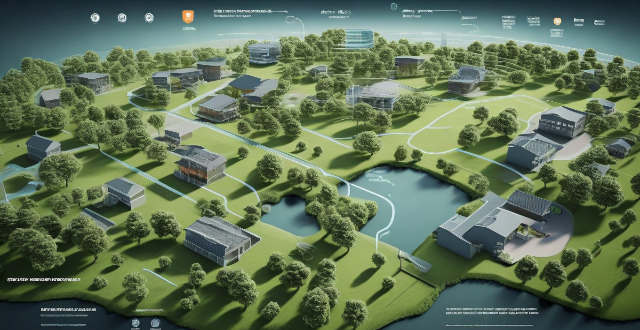
What role does technology play in improving environmental monitoring ?
Technology plays a pivotal role in enhancing environmental monitoring by enabling advanced data collection, analysis, visualization, reporting, and conservation efforts. Satellite imagery, drone surveillance, sensor networks, big data analytics, GIS, real-time reporting systems, and early warning technologies are among the key tools used. These advancements not only improve our understanding of environmental changes but also aid in managing resources and raising public awareness about ecological issues.
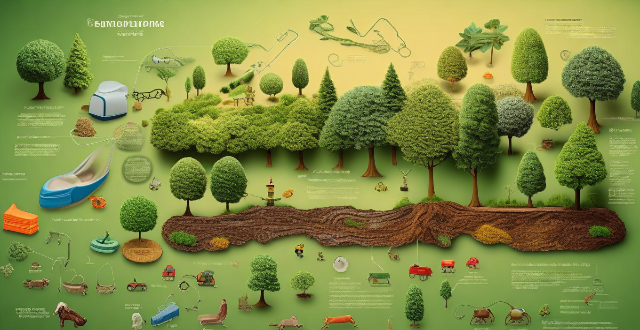
How does climate justice relate to environmental racism ?
This text discusses the interconnected reality of climate justice and environmental racism. It defines both terms, outlines their intersection in terms of historical and structural inequities, disproportionate impacts, mitigation and adaptation inequities, and exclusion from decision-making processes. It then proposes solutions to address this intersection, including promoting participatory democracy, equitable allocation of resources, enforcing environmental justice legislation, and building resilience through education and capacity building. Overall, it emphasizes the need for a more equitable approach to environmental protection and climate action that recognizes and challenges the root causes and impacts of environmental racism within the broader context of climate justice.

What role does environmental psychology play in promoting sustainable behavior ?
This text discusses the role of environmental psychology in promoting sustainable behavior. It highlights key concepts such as perception and cognition, attitudes and values, and behavior change. It also suggests strategies for promoting sustainable behavior, including education and awareness campaigns, community engagement and participation, policy interventions, and technology and innovation. The text concludes that environmental psychology plays a significant role in understanding human perceptions, attitudes, and behaviors related to the environment, and that applying its principles can encourage individuals to adopt sustainable practices and contribute to a more sustainable future.
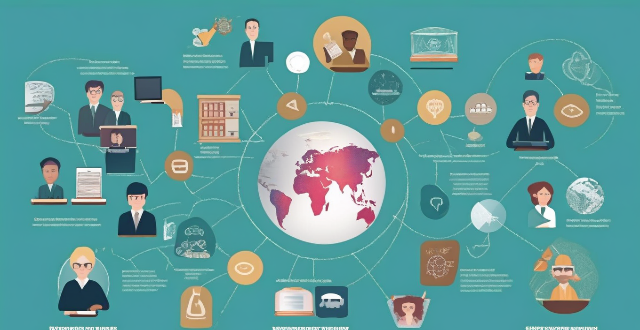
How do these education policy updates align with global education standards ?
Education policy updates align with global education standards in various ways, including curriculum reform, diverse assessment methods, teacher professional development, technology integration, and prioritizing student well-being and inclusivity. These efforts aim to equip students with the necessary skills and knowledge to thrive in a globalized world.

How can we improve climate change education in higher education institutions ?
Climate change is a pressing global issue that requires immediate attention and action. Higher education institutions play a crucial role in shaping the future leaders and decision-makers who will tackle this challenge. Therefore, it is essential to improve climate change education in these institutions to ensure that students are well-equipped with the knowledge, skills, and attitudes necessary to address this complex issue. Key strategies for improving climate change education include integrating climate change into curriculum, promoting research and innovation, engaging students in real-world projects, fostering sustainability on campus, enhancing faculty training and development, and encouraging student leadership and advocacy. By implementing these strategies, higher education institutions can play a vital role in addressing climate change and creating a more sustainable future.

How can education raise awareness about climate change and environmental issues ?
Education can play a crucial role in raising awareness about climate change and environmental issues by integrating these topics into the curriculum, promoting hands-on learning, encouraging critical thinking and problem-solving, fostering collaboration and partnerships, and implementing effective assessment and feedback mechanisms. By empowering students with knowledge and skills, educators can help them make informed decisions and take action to protect our planet.

What role do schools play in fostering environmental consciousness among students ?
Schools play a pivotal role in nurturing environmental awareness in students by integrating eco-themes into curriculum, organizing extracurricular activities, maintaining green infrastructure, engaging with the community, modeling sustainable behaviors, setting eco-friendly policies, running awareness campaigns, offering service learning opportunities, and implementing assessment and recognition programs. These efforts not only educate students about environmental issues but also empower them to take actionable steps toward preserving the planet.
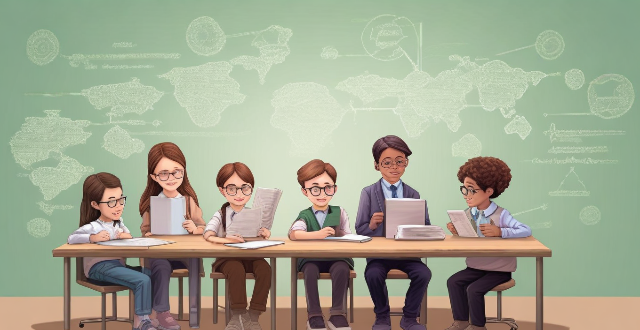
How will these education policy updates impact the future of education in our society ?
Education policy updates may increase access to education, emphasize STEM education, and improve student outcomes.

How can schools incorporate climate change education into their curriculum ?
Incorporating climate change education into school curriculums is crucial for preparing students to address the global issue of climate change. Schools can integrate climate change concepts into existing subjects like science, social studies, literature, and mathematics. Science and geography classes can teach about the causes and effects of climate change, while social studies and history courses can provide a historical perspective on environmental challenges and analyze current policies. Literature and language arts classes can study works that address environmental themes, and mathematics and technology courses can explore data analysis and innovative solutions to combat climate change. Interdisciplinary approaches such as project-based learning and service learning can further enhance climate change education. Research projects and community outreach initiatives allow students to apply their knowledge in real-world settings, promoting interdisciplinary thinking and fostering a sense of personal responsibility for contributing to positive change. Overall, incorporating climate change education into school curriculums is essential for empowering students with the knowledge and skills needed to make informed decisions and take action towards a more sustainable future.
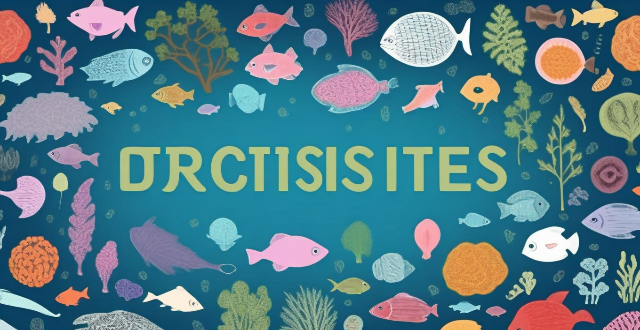
Should governments prioritize environmental subsidy policies over other types of subsidies ?
The text discusses the pros and cons of prioritizing environmental subsidy policies over other types of subsidies, such as healthcare or education. The author argues that while environmental subsidies can help promote sustainable practices and reduce the negative impacts of human activities on the planet, other types of subsidies are also crucial for the well-being of society. The author suggests a balanced approach that considers both environmental sustainability and social welfare, including integrated policy making, targeted subsidies, public-private partnerships, and continuous evaluation.

Can using a carbon footprint calculator help reduce my environmental impact ?
Using a carbon footprint calculator can help individuals reduce their environmental impact by raising awareness, identifying areas for improvement, setting goals, tracking progress, and encouraging sustainable habits.

How can governments implement policies to increase public awareness about environmental issues ?
Governments can increase public awareness about environmental issues by implementing a combination of educational initiatives, community involvement programs, collaborations with NGOs, technological innovations, and regulatory policies. These include integrating environmental education into the school curriculum, broadcasting public service announcements, organizing workshops and seminars, encouraging community involvement through cleanup drives, tree planting events, and recycling programs, forming partnerships with NGOs, providing funding for environmental projects, running joint campaigns with NGOs, developing mobile apps, leveraging social media, offering online courses, implementing bans on single-use plastics, introducing carbon taxes, and enforcing green building codes. By doing so, governments can foster a culture of environmental responsibility and encourage individuals and organizations to take action toward a more sustainable future.

How can environmental legislation be improved to better protect the planet ?
Environmental legislation is crucial for the planet's health and sustainable development. To improve it, enforcement mechanisms should be strengthened with more funding, stricter penalties, and public participation. Regulations should be updated regularly based on scientific advancements, adopting an interdisciplinary approach. Sustainable practices should be promoted through incentives for green technology, eco-labeling programs, and green procurement policies. Protecting vulnerable ecosystems requires expanding protected areas, funding restoration projects, and strengthening species conservation laws. Integrating climate change mitigation involves carbon pricing, renewable energy targets, and adaptation strategies. International cooperation should be enhanced through global agreements, shared resource management, and technology transfer. Communities should be educated and empowered through environmental education, community-based programs, and capacity building.